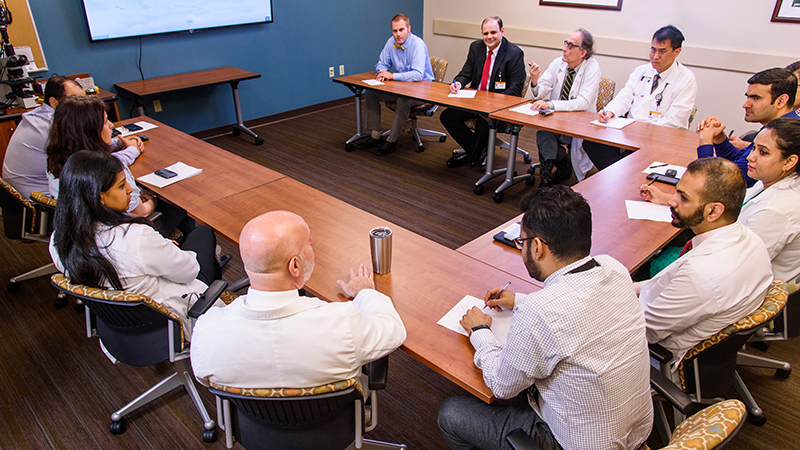
Multidisciplinary tumor boards are vital to cancer treatment plans, bringing together clinicians from different specialties to guide patient treatment and improve outcomes.
However, compiling the relevant data for each case is time-consuming and requires contributions from multiple team members. To optimize the process, researchers at the MU School of Medicine partnered with Roche Diagnostics to evaluate a cloud-based product called NAVIFY® Tumor Board that integrates all relevant clinical data for a tumor board into a single digital dashboard accessible to everyone. During a 16-month clinical study of the dashboard, researchers found NAVIFY Tumor Board significantly reduced the amount of time doctors and nurses across multiple specialties spent preparing for 227 tumor board meetings involving 1866 patient cases.

“In addition to saving time, the NAVIFY digital tumor board solution resulted in less variability in preparation time,” said Richard Hammer, MD, professor of pathology at the MU School of Medicine and vice chair of clinical affairs in the Dept. of Pathology and Anatomical Sciences. “The improvements were sustained and became more significant over time, decreasing administrative burdens of meeting preparation.”
Hammer evaluated case preparation time during four phases: before NAVIFY Tumor Board implementation, after manual implementation, after partial electronic medical record (EMR) integration and after a stable EMR integration phase. The study found a 30% preparation time reduction across three cancer categories with full integration compared to pre-implementation. The biggest time savings involved the breast tumor board, where nurse navigators reduced their preparation time by 69%.
“Institutions with dedicated nurses preparing for cases will likely benefit the most,” Hammer said. “This dashboard enables easy access to clinical data, which may support optimal decision-making. In addition, it reduces costs for both patients and hospitals, which is currently under analysis.”
Hammer’s team is also in the process of submitting data on the impact of the NAVIFY clinical decision support software on case discussion time during tumor board meetings. Future studies will investigate its impact on the quality of case discussions.
“As the first reference site for NAVIFY Tumor Board in the U.S., we are already hosting other institutional leaders to help them implement this software,” Hammer said. “This is the wave of the future, where we are using digital clinical decision support software to enhance how we care for patients, while improving efficiency, standardizing the preparation of cases and making them available to clinicians at any time.”
In addition to Hammer, the study’s co-authors included MU School of Medicine colleague Lincoln Sheets, MD, assistant research professor. Hammer received research funding, an honoraria and serves as an advisor for Roche.
The study, “Digital Tumor Board Solutions Have Significant Impact on Case Preparation,” was published by the journal JCO Clinical Cancer Informatics.





